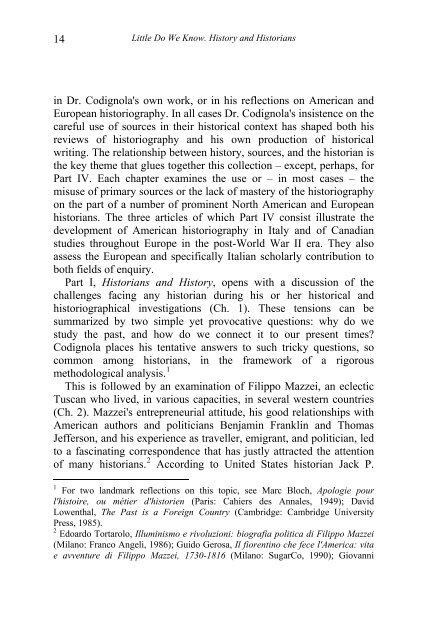Untitled - Istituto di Storia dell'Europa Mediterranea - Cnr
Untitled - Istituto di Storia dell'Europa Mediterranea - Cnr
Untitled - Istituto di Storia dell'Europa Mediterranea - Cnr
Create successful ePaper yourself
Turn your PDF publications into a flip-book with our unique Google optimized e-Paper software.
14<br />
Little Do We Know. History and Historians<br />
in Dr. Co<strong>di</strong>gnola's own work, or in his reflections on American and<br />
European historiography. In all cases Dr. Co<strong>di</strong>gnola's insistence on the<br />
careful use of sources in their historical context has shaped both his<br />
reviews of historiography and his own production of historical<br />
writing. The relationship between history, sources, and the historian is<br />
the key theme that glues together this collection – except, perhaps, for<br />
Part IV. Each chapter examines the use or – in most cases – the<br />
misuse of primary sources or the lack of mastery of the historiography<br />
on the part of a number of prominent North American and European<br />
historians. The three articles of which Part IV consist illustrate the<br />
development of American historiography in Italy and of Cana<strong>di</strong>an<br />
stu<strong>di</strong>es throughout Europe in the post-World War II era. They also<br />
assess the European and specifically Italian scholarly contribution to<br />
both fields of enquiry.<br />
Part I, Historians and History, opens with a <strong>di</strong>scussion of the<br />
challenges facing any historian during his or her historical and<br />
historiographical investigations (Ch. 1). These tensions can be<br />
summarized by two simple yet provocative questions: why do we<br />
study the past, and how do we connect it to our present times?<br />
Co<strong>di</strong>gnola places his tentative answers to such tricky questions, so<br />
common among historians, in the framework of a rigorous<br />
methodological analysis. 1<br />
This is followed by an examination of Filippo Mazzei, an eclectic<br />
Tuscan who lived, in various capacities, in several western countries<br />
(Ch. 2). Mazzei's entrepreneurial attitude, his good relationships with<br />
American authors and politicians Benjamin Franklin and Thomas<br />
Jefferson, and his experience as traveller, emigrant, and politician, led<br />
to a fascinating correspondence that has justly attracted the attention<br />
of many historians. 2 Accor<strong>di</strong>ng to United States historian Jack P.<br />
1 For two landmark reflections on this topic, see Marc Bloch, Apologie pour<br />
l'histoire, ou métier d'historien (Paris: Cahiers des Annales, 1949); David<br />
Lowenthal, The Past is a Foreign Country (Cambridge: Cambridge University<br />
Press, 1985).<br />
2 Edoardo Tortarolo, Illuminismo e rivoluzioni: biografia politica <strong>di</strong> Filippo Mazzei<br />
(Milano: Franco Angeli, 1986); Guido Gerosa, Il fiorentino che fece l'America: vita<br />
e avventure <strong>di</strong> Filippo Mazzei, 1730-1816 (Milano: SugarCo, 1990); Giovanni


